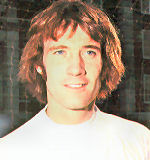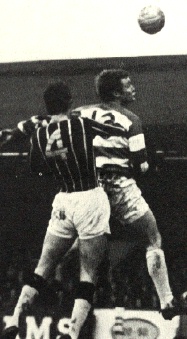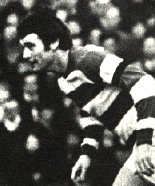
Rodney Marsh
Born Hatfield, October 11, 1944
It is difficult to know how to assess Rodney Marsh’s footballing career. Superstar? Failure? Entertainer? Clown? Genius? Waster?
It is likely that all these options, and more besides, would crop up if a selection of football fans from the sixties and seventies were asked for their opinion. Ultimately it must be considered, for a player who drew so much admiration from so many of the games’ better judges, that his career never hit the heights it might have been expected to.
It is absolutely certain, however, that Rod Marsh left many thousands of people with indelible memories of his impudent skills during his long and eventful career.
Marsh began his career with Fulham, making his first division debut in the 1962-63 season. In many ways this spell at Craven Cottage would encapsulate his future career, when, after an exciting and highly promising beginning, he would ultimately end up languishing in the reserves, an apparent mis-fit.
In his defence Marsh’s progress at Fulham was badly interrupted by a shocking injury which threatened his career and did cost him the hearing in one ear. His talent had not gone unnoticed, however, and in March 1966 the wily Alec Stock spent £15,000 to take Marsh across London to Queens Park Rangers.
Although QPR were then in the third division the move would prove a godsend to Marsh who would go on to play the best football of his career for the club.
Revelling in his new surroundings Rosney Marsh became an instant hero with the Loftus Road crowd. Stock was a man, perhaps the only man, who knew how to get the best from Marsh.
 The QPR manager gave his new signing both the freedom to express himself as well as charging him with a responsibility to deliver consistently. As the teams’ undoubted star Marsh was at liberty to show his skills but knew that there must be an end product if the team was to move forward. The mercurial forward certainly did not disappoint.
The QPR manager gave his new signing both the freedom to express himself as well as charging him with a responsibility to deliver consistently. As the teams’ undoubted star Marsh was at liberty to show his skills but knew that there must be an end product if the team was to move forward. The mercurial forward certainly did not disappoint.
A big, strong man Rodney Marsh also possessed a deftness of touch that set him apart from the main. Often he displayed extravagant pieces of skill or spectacular attempts at goal that would lift the crowd from their seats. It could be called showboating but during his time with Rangers more often than not the result was devastating.
He was a man who produced a buzz of anticipation in the crowd whenever he received possession.
Nobody could ever be completely sure what would happen when Marsh had the ball but they were eager to find out.
His first full season with Rangers was a great one for the club and, individually, his best ever. The club not only won the third division title but the League Cup as well. Marsh plundered forty four goals altogether with thirty in the league and an amazing eleven in the League Cup.
The final provided Marsh with the perfect setting for, perhaps, his finest ever performance. This was the first year the final of this competition had been held at Wembley and Marsh was superb as his team fought back from 2-0 down at the break to run out winners. The highlight of the game was the surge from half way finished by a sweet, low angled drive into the far corner of the net with which Marsh levelled the scores.
The following year QPR achieved a second successive promotion and suddenly Rodney Marsh was back in the first division.
The team was wholly inadequate to meet the challenge of the top flight, however, and plummeted straight back down into the second division with a paltry eighteen points.
To some this was an indication that Marsh’s skills were sufficient only to prosper in the lower divisions although this would be ignoring the facts that most of his teammates were patently not up to the challenge and that his own season was again spoiled by injury.
 Back in the second division Rod Marsh continued to thrill the QPR faithful and finally, in 1971, his consistent brilliance, albeit outside the top flight, persuaded Alf Ramsey to give him a chance in the England Team.
Back in the second division Rod Marsh continued to thrill the QPR faithful and finally, in 1971, his consistent brilliance, albeit outside the top flight, persuaded Alf Ramsey to give him a chance in the England Team.
A few months later another manager decided that Marsh’s enigmatic talents were right for his team. The man was Malcolm Allison, manager of Man City, but the move, certainly at the very beginning, was a disaster.
When he arrived at Maine Road in March 1972 City were clear at the top of the first division and heading for the title. Allison saw Marsh as the man whose skills would rubber stamp their passport to the championship.
Instead the team faltered badly and ended the season in fourth place, albeit only one point behind the eventual champions, Derby County.
Rodney Marsh was an obvious scapegoat for City’s collapse and received widespread criticism and ridicule. So too did Allison who had chosen to throw this maverick into his well drilled side. As his predecessor Joe Mercer somewhat unkindly pointed out, “£200,000 is a lot of money to spend just to lose the championship.”
From then on Marsh’s career became one long anti-climax, containing just one losers medal with City in the 1974 League Cup final on top of an unsatisfactory nine England Caps which brought a solitary goal.
In 1975 Marsh headed for the United States to play for the Tampa Bay Rowdies before returning to England for a brief return to Fulham playing alongside George Best down by the Thames.
This finale brought a rush of public attention and provided some cameo moments but could only ever be a passing farewell given the personalities of the two wildly gifted but inpredictable stars.
Throughout his career Rodney Marsh had offered tremendous entertainment and consistently thrilled crowds wherever he went. Even at Manchester City his performances would often have the terraces enthralled but it somehow seemed relevant that the club picked up its’ first trophy since signing Marsh in the very next season after he left.
Latterly Marsh would become a highly respected television pundit, bringing the same instinctive flair into the studio that had served him so well on the pitch.
Not surprisingly, however, Marsh also retained the characteristic ability to self destruct. Marsh would lose his job with Sky Sports after making an unfortunate, but basically harmless, joke concerning David Beckham’s inability to understand the difference between the Toon Army and the tsunami which had just struck Asia, a joke virtually every football fan must surely have already heard.
Anybody familiar with his fabled response to Alf Ramsey’s pre match threat to pull him off at half time, replying that “All we get at City is an orange and a cup of tea,” would hardly have been surprised at such a conclusion to his television career.
Incidentally the England game before which Rodney Marsh made his quip would be his last.
Rodney Marsh Career Statistics
CLUB GAMES GOALS
Fulham 63 22
Queens Park Rangers 211 106
Manchester City 118 36
Fulham 16 5
England 9 1
Total 418 170
